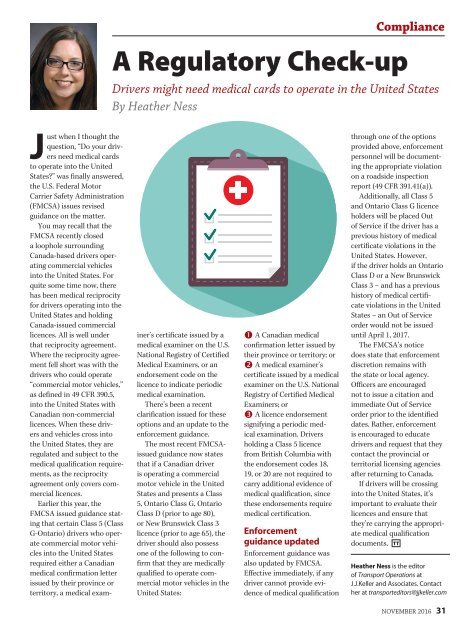DIGGING IN
2faRCNO
2faRCNO
You also want an ePaper? Increase the reach of your titles
YUMPU automatically turns print PDFs into web optimized ePapers that Google loves.
A Regulatory Check-up<br />
Compliance<br />
Drivers might need medical cards to operate in the United States<br />
By Heather Ness<br />
Just when I thought the<br />
question, “Do your drivers<br />
need medical cards<br />
to operate into the United<br />
States?” was finally answered,<br />
the U.S. Federal Motor<br />
Carrier Safety Administration<br />
(FMCSA) issues revised<br />
guidance on the matter.<br />
You may recall that the<br />
FMCSA recently closed<br />
a loophole surrounding<br />
Canada-based drivers operating<br />
commercial vehicles<br />
into the United States. For<br />
quite some time now, there<br />
has been medical reciprocity<br />
for drivers operating into the<br />
United States and holding<br />
Canada-issued commercial<br />
licences. All is well under<br />
that reciprocity agreement.<br />
Where the reciprocity agreement<br />
fell short was with the<br />
drivers who could operate<br />
“commercial motor vehicles,”<br />
as defined in 49 CFR 390.5,<br />
into the United States with<br />
Canadian non-commercial<br />
licences. When these drivers<br />
and vehicles cross into<br />
the United States, they are<br />
regulated and subject to the<br />
medical qualification requirements,<br />
as the reciprocity<br />
agreement only covers commercial<br />
licences.<br />
Earlier this year, the<br />
FMCSA issued guidance stating<br />
that certain Class 5 (Class<br />
G-Ontario) drivers who operate<br />
commercial motor vehicles<br />
into the United States<br />
required either a Canadian<br />
medical confirmation letter<br />
issued by their province or<br />
territory, a medical examiner’s<br />
certificate issued by a<br />
medical examiner on the U.S.<br />
National Registry of Certified<br />
Medical Examiners, or an<br />
endorsement code on the<br />
licence to indicate periodic<br />
medical examination.<br />
There’s been a recent<br />
clarification issued for these<br />
options and an update to the<br />
enforcement guidance.<br />
The most recent FMCSAissued<br />
guidance now states<br />
that if a Canadian driver<br />
is operating a commercial<br />
motor vehicle in the United<br />
States and presents a Class<br />
5, Ontario Class G, Ontario<br />
Class D (prior to age 80),<br />
or New Brunswick Class 3<br />
licence (prior to age 65), the<br />
driver should also possess<br />
one of the following to confirm<br />
that they are medically<br />
qualified to operate commercial<br />
motor vehicles in the<br />
United States:<br />
A Canadian medical<br />
confirmation letter issued by<br />
their province or territory; or<br />
A medical examiner’s<br />
certificate issued by a medical<br />
examiner on the U.S. National<br />
Registry of Certified Medical<br />
Examiners; or<br />
A licence endorsement<br />
signifying a periodic medical<br />
examination. Drivers<br />
holding a Class 5 licence<br />
from British Columbia with<br />
the endorsement codes 18,<br />
19, or 20 are not required to<br />
carry additional evidence of<br />
medical qualification, since<br />
these endorsements require<br />
medical certification.<br />
Enforcement<br />
guidance updated<br />
Enforcement guidance was<br />
also updated by FMCSA.<br />
Effective immediately, if any<br />
driver cannot provide evidence<br />
of medical qualification<br />
through one of the options<br />
provided above, enforcement<br />
personnel will be documenting<br />
the appropriate violation<br />
on a roadside inspection<br />
report (49 CFR 391.41(a)).<br />
Additionally, all Class 5<br />
and Ontario Class G licence<br />
holders will be placed Out<br />
of Service if the driver has a<br />
previous history of medical<br />
certificate violations in the<br />
United States. However,<br />
if the driver holds an Ontario<br />
Class D or a New Brunswick<br />
Class 3 – and has a previous<br />
history of medical certificate<br />
violations in the United<br />
States – an Out of Service<br />
order would not be issued<br />
until April 1, 2017.<br />
The FMCSA’s notice<br />
does state that enforcement<br />
discretion remains with<br />
the state or local agency.<br />
Officers are encouraged<br />
not to issue a citation and<br />
immediate Out of Service<br />
order prior to the identified<br />
dates. Rather, enforcement<br />
is encouraged to educate<br />
drivers and request that they<br />
contact the provincial or<br />
territorial licensing agencies<br />
after returning to Canada.<br />
If drivers will be crossing<br />
into the United States, it’s<br />
important to evaluate their<br />
licences and ensure that<br />
they’re carrying the appropriate<br />
medical qualification<br />
documents. TT<br />
Heather Ness is the editor<br />
of Transport Operations at<br />
J.J.Keller and Associates. Contact<br />
her at transporteditors@jjkeller.com<br />
NOVEMBER 2016 31


